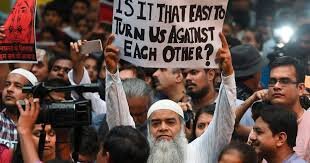Hawzah News Agency (New Delhi - India) - They are assertive, resolute and articulate. They are attracting admirers and getting noticed by their detractors. They are India's new Muslim youth leaders fighting injustice and inequality.
Since India's Hindu nationalist-dominated Parliament passed a law that grants citizenship to refugees from Afghanistan, Bangladesh and Pakistan as long as they are not Muslim, there have been protests across the country demanding its repeal.
The movement against the controversial Citizenship Amendment Act (CAA), which was passed in December 2019, gathered momentum after protesting students faced a brutal police response.
Delhi police's beating of students at Jamia Millia Islamia, one of India's top universities, in the initial days of what became a national anti-CAA movement was the catalyst for the famous Shaheen Bagh protest in the city.
When Jamia protesters were assaulted, a group of women from the Muslim neighborhood of Shaheen Bagh came out of their homes, occupied a part of the main road and did not leave the site for 101 days.
The sit-in inspired similar protests not only in Delhi but in many states and energized the 200 million-strong Muslim community to demand an end to discriminatory state policies. Shaheen Bagh became a symbol of the anti-CAA movement. Activists and leaders belonging to different backgrounds and faiths considered it a matter of prestige to speak from its platform.
On some days, Shaheen Bagh received tens of thousands of people, including those who came out of curiosity to see how a group of women had organized such a large protest that went on around the clock.
It became a thorn in the government's side and was reviled by various Hindu nationalist groups and Bharatiya Janata Party (BJP) leaders.
Then came the coronavirus. Since then, everything has changed for the mass movement. What has not changed is the disdain Hindu nationalists hold for the leaders and activists who oppose the citizenship act, which critics say flouts India's constitution that grants equal rights to people of all religions.
The coronavirus risk led to the thinning of crowds at Shaheen Bagh, and finally the site was cleared by police on March 24 when there were just a few protesters left, in the new era of social distancing.
Another nonstop protest at Jamia Millia Islamia was dismantled in a similar fashion.
Delhi police were meticulous in removing graffiti, painted slogans, posters and other signs of protest.
Now the police are using the opportunity provided by the sweeping restrictions on public movement during the pandemic to victimize high-profile campaigners and activists. Among them are Meeran Haider and Safoora Zargar, both research scholars at Jamia Millia Islamia.
Kafeel Khan, Sharjeel Imam and Khalid Saifi were arrested before the coronavirus lockdown. "The anti-CAA movement has produced new, articulate and fearless leaders. They refuse to remain silent spectators to the Muslim community's oppression and marginalization. The authorities want to create a climate of fear by intimidating us," said Afreen Fatima, who has campaigned against the controversial law.
Also on Feb. 26, I called Saifi, one of the arrested activists, to inquire about the situation in the violence-hit areas. On the few occasions I had met him before, I found him knowledgeable, smart, sharp and media-friendly.
The coronavirus restrictions mean that supporters of the arrested activists cannot do much for them apart from talking to the media or expressing their anger and frustration online.
"It is an apt time for the police. It is very strategic on their part to arrest people because we cannot come out into the streets physically to organize solidarity actions. The BJP has shown that it doesn't care about the pandemic and won't hesitate to use the coronavirus situation to pursue its hate agenda and propaganda against Muslims," Fatima said.
The message is clear: The new generation of Muslim leaders cannot be manipulated or bullied easily.


Your Comment